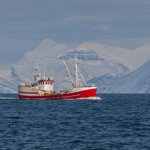Study: Warmer waters a factor in Atlantic cod fishery collapse
A new report is suggesting for the first time that rapid warming of the Atlantic Ocean off the northeast coast of the United States played a role in the collapse of the cod fishery there.
The report, published by the academic journal Science, said cod stocks shrank because waters in the Gulf of Maine warmed 99 percent faster there than anywhere in the world, preventing cod from recovering from even a minimal fishing effort.
“Managers kept reducing quotas, but the cod population kept declining,” said Andrew Pershing, Chief Scientific Officer of the Gulf of Maine Research Institute (GMRI) and lead author of the study. “It turns out that warming waters were making the Gulf of Maine less hospitable for cod, and the management response was too slow to keep up with the changes.”
The report attributed the warming to “changes in the position of the Gulf Stream and to climate oscillations in the Atlantic and the Pacific,” and also mentioned global climate change as a factor.
Fisheries management, Pershing said, did not take into account the warming water temperature when calculating quotas, meaning fishermen were obeying the rules and still inadvertently contributing to the depletion of cod stocks.
“This creates a frustrating situation that contributes to mistrust between fishermen, scientists, and managers,” Pershing said. “The first step toward adapting fisheries to a changing climate is recognizing that warming impacts fish populations.”
GMRI produced the report together with the University of Maine, Stony Brook University, the Bigelow Laboratory for Ocean Sciences, and the National Oceanic and Atmospheric Administration. The Lenfest Ocean Program and the U.S. National Science Foundation both funded the work.





Share